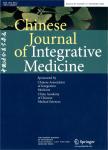Evidence-Based Dampness-Heat ZHENG(Syndrome) in Cancer: Current Progress toward Establishing Relevant Animal Model with Pancreatic Tumor
作者机构:Department of Integrative OncologyFudan University Shanghai Cancer CenterShanghai(200032)China Department of OncologyShanghai Medical CollegeFudan UniversityShanghai(200032)China
出 版 物:《Chinese Journal of Integrative Medicine》 (中国结合医学杂志(英文版))
年 卷 期:2024年第30卷第1期
页 面:85-95页
核心收录:
学科分类:1006[医学-中西医结合] 100602[医学-中西医结合临床] 10[医学]
基 金:Supported by the National Natural Science Foundation of China (No. 81930115)
主 题:cancer Chinese medicine syndrome ZHENG dampness-heat syndrome animal model pancreatic tumor evaluation methods
摘 要:Cancer is one of the deadliest diseases affecting the health of human beings. With limited therapeutic options available, complementary and alternative medicine has been widely adopted in cancer management and is increasingly becoming accepted by both patients and healthcare workers alike. Chinese medicine characterized by its unique diagnostic and treatment system is the most widely applied complementary and alternative medicine. It emphasizes symptoms and ZHENG(syndrome)-based treatment combined with contemporary disease diagnosis and further stratifies patients into individualized medicine subgroups. As a representative cancer with the highest degree of malignancy, pancreatic cancer is traditionally classified into the amassment and accumulation. Emerging perspectives define the core pathogenesis of pancreatic cancer as dampness-heat and the respective treatment clearing heat and resolving dampness has been demonstrated to prolong survival in pancreatic cancer patients, as has been observed in many other cancers. This clinical advantage encourages an exploration of the essence of dampness-heat ZHENG(DHZ) in cancer and investigation into underlying mechanisms of action of herbal formulations against dampness-heat. However, at present, there is a lack of understanding of the molecular characteristics of DHZ in cancer and no standardized and widely accepted animal model to study this core syndrome in vivo. The shortage of animal models limits the ability to uncover the antitumor mechanisms of herbal medicines and to assess the safety profile of the natural products derived from them. This review summarizes the current research on DHZ in cancer in terms of the clinical aspects, molecular landscape, and animal models. This study aims to provide comprehensive insight that can be used for the establishment of a future standardized ZHENG-based cancer animal model.



